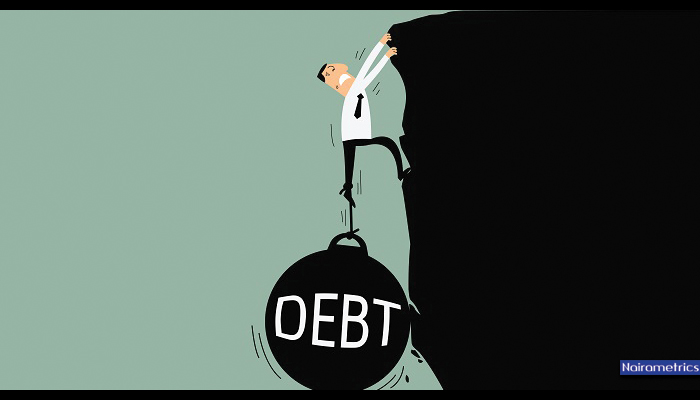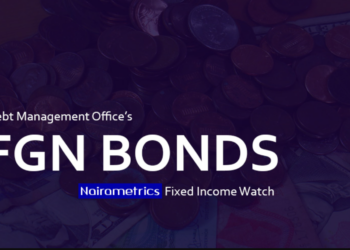Nigeria’s Total Debt Stock (Foreign & Domestic), as at June 2020 stood at N31.01 trillion ($85.9 billion)- 8.31% increase when compared with N28.63 trillion ($79.3 billion) recorded in March 2020. This was disclosed in the Nigeria public debt report, recently released by the Debt Management Office (DMO).
The breakdown shows that total external debt stood at N11.36 trillion ($31.47 billion), accounting for 36.65% of the total debt stock, while domestic debt represented 63.35% of the total debt. Domestic debts stood at N19.65 trillion ($54.42 billion) as at June 2020.
READ: CBN pays $4.45 billion external debt to World Bank, others in 2-month
The report also reveals that N921.9 billion was used to service domestic debts between January and June 2020, while N288.6 billion ($759.6 million) was used on foreign debts, making a total of N1.21 trillion. Compared to N1.06 trillion spent in the same period of 2019, debt service increased by 14.6%.
Highlights
- Federal government foreign debt in the period under review stood at N9.82 trillion ($27.2 billion). This represents 86.5% of the total foreign debts, while the 36 States and the Federal Capital Territory recorded external debt of N1.54 trillion ($4.26 billion).
- In terms of domestic debts, the federal government accounted for 78.7% of the federation local debts, as States including the FCT accounted for the remaining 21.3%.
- Foreign debt grew by 13.8%, compared to $27.7 billion (N9.9 trillion) recorded as at the first quarter of the year.
- Nigeria’s public debt grew by $22.09 billion in the last 5 years, indicating an increase of 34.6%.
READ: 2020 revised budget, spending inefficiencies, and a looming debt hole
According to the press release, the recent increase in Debt Stock was as a result of the $3.36 billion Budget Support Loan from the International Monetary Fund (IMF), New Domestic Borrowing, which was used to finance the Revised 2020 Appropriation Act, including the issuance of N162.56 billion Sukuk, and Promissory Notes issued to settle Claims of Exporters.
Meanwhile, a cursory look at the historic trend shows that Nigeria’s total public debt increased by $22.09 billion between June 2015 and June 2020, when multiplied by the prevailing exchange rate of N380/$1, it translates to a total additional loan of N8.39 trillion within 5 years of the current administration.

Despite facing economic downturn caused by the COVID-19 pandemic, and characterized by contraction in economic activities, reduced capital inflows, trade decline across international borders, coupled with reduced government revenue as a result of decline in global oil price; Nigeria spent a sum of N1.21 trillion to service both domestic and foreign debts between January and June 2020.
Download the Nairametrics News App
The N1.21 trillion debt service expense represents 11.2% of the total revised budget of N10.8 trillion for the year 2020, an indication that over 11% of this year’s budget has been expended on debt servicing just half-year. Meanwhile, the funds being spent on debt servicing can be seen as another way of wasting limited resources while funding very little capital expenditure, that could be used to stimulate the productivity of the country.
Data from the Central Bank of Nigeria (CBN) shows that over the past 5 years spanning 2015 and 2019, the Nigerian government spent about N34.83 trillion, comprising of both recurrent expenditure (73.1%), capital expenditure (19.2%) and transfers (7.8%). This means that only about 19% of the debt load has been invested in further developing the nation through the creation of relevant infrastructure. The rest were spent on recurring expenses like salaries.
READ: LCCI condemns Senate over Buhari’s $22.7 billion loan approval
More loans to be expected
The DMO stated in its press release, that it expects the Public Debt Stock to grow as the balance of the New Domestic Borrowing is raised, and expected disbursements are made by the World Bank, African Development Bank (AFDB), and the Islamic Development Bank, which were arranged to finance the 2020 Budget.
It also stated that Additional Promissory Notes are expected to be issued in the course of the year, this, and new borrowings by State Governments, are also expected to increase the Public Debt Stock.


















